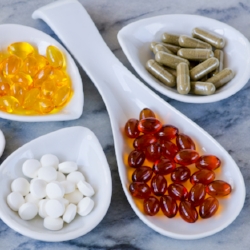STRESS & SUPPLEMENTS IN PRECONCEPTION
Feb 05, 2018
Part 3 of our 4-Part Series on Preconception
STRESS MANAGEMENT in PRECONCEPTION
Stress has a documented impact on fertility. Studies have confirmed that stress inhibits the hypothalamic-pituitary-gonadal (HPG) axis. The stress hormones cortisol, epinephrine, and norepinephrine, and the hypothalamic-pituitary-adrenal (HPA) axis directly interact with several other hormones, including hormones that regulate the menstrual cycle and gamete maturation.
Stress can modify levels of follicle-stimulating hormone (FSH) and luteinizing hormone (LH), which directly impact synthesis of estrogen and progesterone, and dictate follicular maturation and ovulation in women and spermatogenesis and testosterone production in men. Elevated cortisol and ACTH in men can also inhibit the conversion of androstenedione into testosterone. Higher follicular cortisol/cortisone ratios are associated with higher rates of infertility in women. It has been noted that men with increased stress have a decrease in glutathione and free sulphydryl content of semen, both of which are important for combating oxidative stress and toxin exposure.
Interestingly, the link between stress and female fertility goes beyond an increase in stress hormone levels and their downstream effects. Hans Selye observed ovarian atrophy in response to stress in rats. It is important to acknowledge that stress mediators can be protective, not just damaging, though high levels can lead to allosteric overload, where there is a high likelihood of changes to the physiological systems that affect fertility.
It seems that various methods of stress management and counseling may be successful for couples trying to conceive. Mind/body intervention increased IVF pregnancy rates from 43% to 52% in a group of women under 40 who were about to start their first IVF cycle at a Massachusetts fertility clinic. Additionally, “letting go” counseling, focused around releasing control of the process of conception, has also shown to be beneficial. This type of counseling nearly doubled pregnancy rates in the treatment group. Many other interventions have shown benefit for both men and women, including standard psychotherapy.
It is essential for practitioners to work with patients to develop a stress-management protocol that will work for each couple, and to be sensitive to the fact that a robust treatment plan may create an increased focus on infertility and, therefore, an increase in stress, in and of itself.
BASIC PRECONCEPTION SUPPLEMENTATION
In my opinion, every couple trying to conceive should be put on a basic preconception supplement regimen. Specific nutrients, such as folic acid, have been shown to be beneficial for not only preventing serious birth defects like spina bifida, but also for negating deleterious epigenetic effects to the offspring of parents with toxic exposures, poor nutrition, and elevated stress levels No couple lives in a perfect world; however, these extra precautions may not only promote fertility, but may also have a significant impact on the offspring’s adult health status. The most simple preconception program would include a good multivitamin and fish oil for both partners.
A prenatal multivitamin provides key nutrients necessary for both mom and baby throughout fetal development. These include iron, calcium, folate, and zinc. Studies have demonstrated significantly improved pregnancy rates in women on multiple micronutrient supplements, compared to folic acid alone (66.7% vs 39.3% achieved conception after 3 menstrual cycles; the ongoing pregnancy rate was 60% vs 25%). Compared to consumption of folic acid and iron alone, consumption of a prenatal multivitamin has also been associated with significantly improved birth outcomes, including healthier birth weight of babies, and decreased rates of stillbirth and miscarriage. A nonsignificant trend of decrease in neonatal deaths has also been observed.25 Not surprisingly, the same study also reported that mothers who took a prenatal vitamin had better micronutrient status postpartum.
Fish oil is another key supplement to include in a preconception protocol for every couple who is contemplating pregnancy within the next 6 months. It has been observed that, compared with infertile men, fertile men tend to have higher blood and spermatozoan levels of omega-3 fatty acids, as well as lower serum ratios of omega-6 to omega-3.26 For men with oligoasthenoteratospermia (OAT) – the worst semen parameters possible – supplementation with omega-3s significantly improved semen parameters, including increasing sperm count from 38.7 to 61.7 million semen, and increasing sperm concentration from 15.6 to 28.7 million/mL.27 It is clinically useful to understand that a sperm concentration greater than 20 million/mL is associated with a much higher rate of clinical pregnancy compared to below 20 million/mL, where the likelihood of natural conception is considered to be approximately zero. This fact further emphasizes fish oil benefits. Fish oil supplementation has also been correlated with increased superoxide dismutase (SOD)-like and catalase-like activity (both of which promote an increased ability to withstand oxidative stress), as well as positive, nonsignificant improvements in sperm motility and morphology.
While there are fewer studies validating the benefit of omega-3 supplementation in women, it is fair to assume that the significant benefits to gamete production in men would have some correlation to the analogous structure in a woman, the egg. Increased dietary intake of omega-3 fatty acids in women, especially alpha-linolenic and docosahexaenoic acids (DHA), have been correlated with an improvement in embryo morphology in couples undergoing IVF with ICSI.
REFERENCES AVAILABLE ON REQUEST







